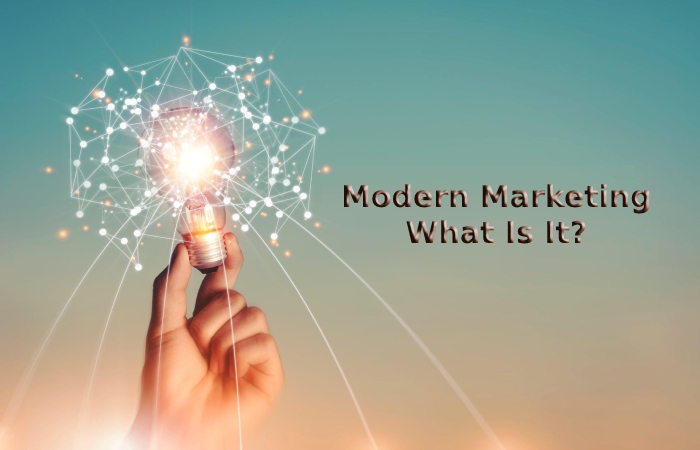Share This Article
Introduction
Modern marketing is a holistic, agile, data-driven approach connecting brands with their customers to drive targeted business results. To achieve this equal of personalization, we must develop a deep understanding of our customs as modern marketers.
Modern Marketing What Is It?

Marketing as we know it has changed; the same definitions and concepts of ten or fifteen years ago are no lengthier valid in today’s reality. Marketing is the set of several fundamental techniques to increase the sales of a particular product or service, or as Philip Kotler would say, “Marketing is a social and administrative process over which groups and persons get what they need and want, generating, offering and exchanging products of value with their peers.” Next, we bring you the definition of modern marketing, its fundamentals, and characteristics:
Marketing is changing, given its environment, population, and technology. It has experienced many variations over the years due to increased customization in the retail space. It all started with the Marketing 1.0 model of Henry Ford’s companies in the first half of the 20th century; here, many goods were produced at low prices so that as many people as possible could buy them. Subsequently, the Marketing Model 2.0 emerged, which proposed a greater specialization for each client to know what they want. Marketing was no longer just a reason to produce and sell but to adapt production to the wishes of the well-informed customer.
The modern marketing model, or Marketing 3.0, is entirely different from what we know, and it goes one step further and anticipates the values of the company it represents. Today we live surrounded by conscious consumers who seek the best for themselves and the world. For this reason, they will demand that the brands they consume be totally sustainable and socially responsible for their environment.
Modern Marketing: Fundamentals and Characteristics.
The modern marketing model or Marketing 3.0 comprises ten fundamentals and necessary characteristics when implementing it. These ten fundamentals are divided into four main categories: Strategy, Analysis, Planning, and Execution.
- Strategy refers to what and how we want to achieve it.
- The analysis gives us the ease of having the necessary information.
- Planning allows us to indicate the achievement of your objectives.
- The run does everything described above.
1. Strategy
The marketing strategy is one of the most important points because it generates the actions we want to implement. This is where you need to consider how marketing could improve business strategy. Then it is time to set goals to achieve.
2. Analysis – Market and Customer Orientation
The analysis, better known as market and customer orientation, tries to understand the market environment fully. Consider the competition, how they behave, and what their moves are.
3. Analysis – Knowing the Client
If we don’t know our customers, it becomes hard for us to sell to them. It helps us to know our customers and, best of all, what their purchase prospects are and what needs they poverty to cover.
4. Analysis – Brand and Value
The brand is a fundamental factor in modern marketing; the brand must be better for us and others than the competition. Therefore, you have to provide that factor or quality that others do not have.
5. Planning – Segmentation and Targeting
Now that we have analyzed the environment and decided how to use marketing thoroughly, it is time to segment and focus on the client’s profile that interests us and our buyer persona.
6. Planning – Positioning
In the digital stage, it is clear that positioning is essential in modern marketing. This means the path to a specific previously selected customer or buyer persona profile. Remember that we can target different customer segments, which allows us to choose various ways of positioning.
7. Execution – Customer Experience
Also known as “customer experience,” customer experience is crucial in determining whether the ad is positive or negative. For example, it is beneficial to understand how the customer came to you- where or through whom he had to go to get your product or service.
8. Execution – Distribution
Sales, as the word says, is the medium or means by which the customer can be reached. For example advertising banners, social networks, television, radio, etc.
9. Execution – Integrated Marketing Communications
How should our brand’s message reach the target group? Here it would help if you used all available means to promote the product or service.
10. Execution – Data and Measurement
As in any business, regular measurement of results is imperative. In this way, we can see if we are doing things right or if there are errors and points for improvement that will help us obtain better results.
What do you Think of Modern Marketing?
It is exciting to see how marketing has changed over the years due to new technologies and the population’s preferences. Try to work together, integrate all channels, and generate the expectations raised in front of a brand.
Conclusion
Modern marketing is the most exciting of all business sports and is the heartbeat of every successful business. It is constantly altering in response to the bang of information, the expansion of technology, and the ferociousness of competition at all levels and everywhere.
Every business strategy is a modern marketing strategy. Your aptitude for thinking clearly and well about the best marketing strategies and continually changing and improving your activities is key to the future of your business.
Fortunately, like all business skills, marketing can be learned through practice, experimentation, and constant mistakes. The main is to test, test, and test. And any modern marketing strategy that works for you today, no matter how…
Also Read: Online Marketing Gurus – The Best Way To Learn Online Marketing


